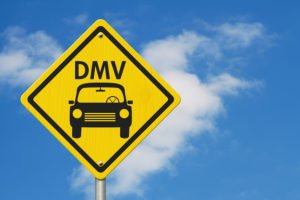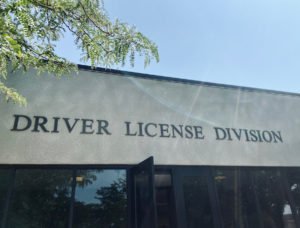
Every Colorado DUI arrest creates both criminal and DMV administrative cases. In the same way that you are entitled to a criminal trial to fight the criminal charges, you are also entitled to a DMV trial – called an express consent hearing – to fight the license revocation.
Here are the top five questions and answers about express consent hearings (DMV hearings) in Colorado:
1. Is Colorado an express consent state?
Yes. As an express consent state, Colorado requires you to submit to a chemical breath test or chemical blood test if you get arrested for:
- driving under the influence of alcohol (DUI),
- driving while ability impaired (DWAI), or
- underage drinking and driving (UDD).
Refusing the Chemical Test
Refusing a chemical test carries severe penalties, including:
- 1-year driver’s license suspension,
- Colorado “persistent drunk driver” (PDD) designation,
- Alcohol and drug education and treatment,
- An ignition interlock device (IID) in your vehicle for at least one year, and
- SR-22 insurance requirements.
Additionally, violating Colorado’s express consent laws by refusing a chemical test is admissible as evidence of guilt should your DUI case go to trial.1
2. What is an express consent hearing?
An express consent hearing (a.k.a. Colorado DMV hearing) is an administrative hearing where you can contest your license suspension by the DMV. It is completely separate from your DUI criminal case: You can win your criminal case and still lose your DMV hearing, and vice versa.
Express consent hearings resemble trials in that you can present evidence and cross-examine witnesses, and a DUI defense attorney can represent you. They occur at the DMV, but you can usually attend telephonically (which most people do to avoid taking time off work).
The Hearing Officer
DMV hearings are presided over by a hearing officer. Hearing officers both prosecute the case and decide whether or not you were in control of a motor vehicle while intoxicated and should lose your license.
The hearing officer may act like they are impartial, but they are a DMV employee and, therefore, not on your side. Hearing officers are not actual judges (and often not lawyers).2
3. What is an express consent affidavit?
An express consent affidavit and notice of revocation is a piece of paper notifying you that your license will be revoked in seven days. This paper also serves as your seven-day driving permit.
If you take the evidentiary breath test, you receive your express consent affidavit right away from the arresting police officer.
If you take the evidentiary blood test, you get your express consent affidavit mailed to you several weeks after the arrest if your blood alcohol content (BAC) test results come back as having been 0.08% or higher within two hours of you driving.3
4. How long do I have to request a DMV hearing in Colorado?
If you choose to take the evidentiary breath test or if you refused to take a test, the officer confiscates your driver’s license and gives you a notice of revocation that also serves as a seven-day temporary driver’s license. You have only those seven calendar days to request a DMV hearing.
If you take the evidentiary blood test, you get to keep your license until the DMV mails you an “order of revocation.” At that point, you have ten days after the postmarked date of the letter to request a DMV hearing. During those ten days, you can continue driving since the notice of revocation is a temporary license.
(After your DUI arrest, go online at myDMV (colorado.gov) to ensure the Colorado DMV has your current address. The DMV uses the address on file, not what you tell the arresting officer. If necessary, change your address with the DMV.)
Requesting a DMV Hearing
In order to request a DMV hearing, you can go to the local full-service DMV office and stand on the “Driver Services/Licenses” line with your express consent affidavit and notice of revocation (or the letter the DMV mailed you with your blood results). You will surrender your temporary license, and the DMV clerk will then give you another temporary license pending the results of the DMV hearing – which will occur within 60 days.
The temporary license will be a yellow carbon copy entitled, “Request for Administrative Hearing Pursuant to Notice of Revocation for Express Consent.” You cannot drive without it. Over the next few days, check your mail for a “Notice of Hearing” from the DMV with the hearing date.
Requesting Your DMV Hearing Online
You can request a DMV hearing online at myDMV (colorado.gov):
- Select “Driver/ID Services.”
- Select “Request a Hearing” under “Appointment and Hearings.”
- Enter the requested information and submit (which triggers an auto-response confirmation).
- Wait for 24 to 48 hours for a temporary permit to drive pending your DMV hearing.
- Check your email and mail for a notice from the DMV scheduling your express consent hearing date.
Requesting the Officers To Appear at Your Hearing
When you request a DMV hearing, you can also request that the officer who signed your express consent affidavit (or any of the other officers in your case) appear at the hearing.
Alternatively, you can subpoena the officer(s) to appear by filling out the Request to Subpoena form and emailing it to dor_hearingrequest@state.co.us for approval. Once they email back with the approval, you have to make sure the officer(s) get properly served within five calendar days of the hearing. (Any other witnesses you subpoena do not need to be served until 48 hours before the hearing.)
Although DMV hearings are scheduled within 60 days of your request, the DMV can postpone (“continue”) it if the officer has a valid excuse to delay it.
Waiving Your DMV Hearing
Not requesting a DMV hearing by the deadline triggers an automatic license revocation, and you forfeit your right to contest.
A first-time DUI offense carries a nine-month revocation. Meanwhile a second DUI offense – or a first-time refusal to take a chemical test – carries a year-long revocation.
Whether you waive or lose the DMV hearing, you can apply to the DMV to drive with an ignition interlock device-restricted license. If you are approved, you can drive right away if it is your first- or second-time DUI. If you refused the chemical test though, there is a two-month wait before you can drive with an IID-restricted license.4
Requesting a DMV Hearing Late
You can request a DMV hearing after the deadline, but there is no guarantee you will get one. Plus you cannot drive while your request is pending.
If you miss the deadline to request a DMV hearing but still want one, you can email dor_hearingrequest@state.co.us a “Request For a Late Hearing.” This does not require an official form, but make sure your email includes:
- the reason you were late to request a hearing (such as being in jail or the hospital),
- your case number,
- your license or identification card number, and
- your valid mailing address.

You should not waive your right to a DMV hearing.
5. Can I win an express consent hearing?
Yes, but it is difficult in the state of Colorado.
In criminal DUI trials, the prosecution has the burden to prove beyond a reasonable doubt that you drove impaired or with an illegal blood alcohol level. In administrative DMV hearings, the state must only find by a preponderance of the evidence that you committed DUI.
This means the DMV can find against you even if there is a reasonable doubt. It just has to be more likely than not that you had an illegal blood alcohol level or were driving drunk or high.
How the Hearing Officer Makes its Decision
When determining whether you committed DUI, the hearing officer will consider the following factors:
- Whether you were in “actual physical control” of a motor vehicle in Colorado;
- Whether the police had reasonable suspicion to pull you over;
- Whether the police had probable cause to arrest you;
- Whether the police correctly advised you of Colorado’s express consent law;
- Whether the chemical breath- or blood test was administered legally and correctly; and
- Whether you were cooperative about taking the chemical test.
Whether DMV Hearings Are Worth Doing
Ultimately, DMV hearings are very difficult to win – even if you have good arguments on your side. Though DMV hearings are always worth doing for three main reasons:
- There is always a chance that you will win on the merits or a technicality, and a license revocation is the worst that can happen if you lose;
- There is always a chance the arresting officer will not show up, allowing you to win by default.
- DMV hearings are a cost-free opportunity to cross-examine the arresting officer under oath and impeach the officer’s credibility. This will then help your attorney craft a defense in the criminal case without having to pay for expensive depositions.
If you win your express consent hearing, the DMV will still revoke your driving privileges if you ultimately lose your criminal case. The only way to completely avoid a license suspension following a DUI is to win both the criminal case and the DMV hearing.
Even if the DMV revokes your license, you should have the opportunity to resume driving on a restricted license if you install an ignition interlock device in your vehicle. DUI lawyers can help you get an early reinstatement of your license.5
Additional Resources
For more information, refer to these official Colorado DMV websites:
- The DUI Process – A general overview of the DMV’s role in DUI cases.
- DUI Administrative Process – A step-by-step summary of DMV hearings and how they work.
- Alcohol DUI – General overview of Colorado DUI laws.
- SR-22 and Insurance Information – Information on when you need to obtain proof of financial responsibility as a condition of reinstating your license.
- Reinstatements – Instructions on how and when to resinstate your driver’s license.
Legal References
- CRS 42-4-1301.1; CRS 42-1-102(68.5); CRS; CRS 42-2-126(B); CRS 42-2-132.5; CRS 42-4-1301. See, for example: Colorado Dep’t of Revenue, Motor Vehicle Div. v. Kirke (; Colorado Div. of Revenue v. Lounsbury (
- CRS 42-2-126; CRS 42-4-1301.
- Express Consent Cases Procedures, Colorado DMV. SB21-055.
- Frequently-Asked-Questions – Colorado DMV; CRS 42-2-126. Note that you can also request a DMV hearing over email to the Express Consent Unit at dor_hearingrequest@state.co.us, though it is recommended you use the myDMV.com system. 1 CCR 211-2.
- To confirm that you have met all the requirements to drive again, call the DMV’s Driver Services at 303-205-5613.

